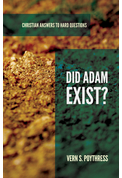Brief Book Notice by Fred Zaspel
On several occasions here I have mentioned my appreciation for P&R’s excellent Christian Answers to Hard Questions series (see here, here, here, here, here, and here). It is a series of booklets treating difficult and important questions in brief space (about 30+ pages each) on a popular level—Important answers accessible to all readers. The idea of the series is brilliant, and the booklets consistently live up to expectations.
Somehow we have not yet mentioned Did Adam Exist by Vern Poythress, and having occasion to look through it again I was reminded of its value. For the believer, the historicity of Adam is hardly a difficult question, but handling the scientifically oriented objections of the Bible’s critics is complex, and most of us will welcome the help of a trusted guide to sort out the various questions involved. This is what Poythress does for us simply, briefly, and masterfully.
Let’s take the argument that the human DNA is 99% the same as that of a chimpanzee. How do we interpret this raw data? What does it indicate? First, we might challenge the accuracy of the claim itself—99% the same? As it turns out, it’s not quite that simple, as Poythress explains. Still, the similarity is high, and Poythress leads us to see that the interpretation of data depends first on certain presuppositions that are already in place. If we assume naturalistic gradualism—that is, if we assume the evolutionary model—it’s strong evidence indeed! But it must be acknowledged that the raw data itself doesn’t demand evolution – unless evolution is presupposed. Moreover, although it could be understood to account for the similarities between chimps and humans, it does not account for the differences between them. This data itself makes no pronouncements but depends on the interpretive grid we have in place. If, on the other hand, we assume that God is the creator, the common DNA will immediately be understood in terms of common design—man was made “a living creature” (Gen.2:7; cf. 1:20, 21, 24). And, to boot, the creation model would account for both the similarities and the differences between chimps and humans—man is made in the image of God. And for that matter, just how different from chimps must humans be to prove that they are distinct creations? All of this points up the role of presuppositions in the interpretation of scientific data, and Poythress guides us through it simply and helpfully.
Poythress guides us through discussions of the so-called “junk” DNA and arguments based on genetic diversity (the question of an original human pair) with uncommon ease. He displays a close acquaintance with the scientific research, and he exposes the philosophical underpinnings of the scientific work—all with ease and clarity.
The text of Poythress’s booklet is under 30 pages, of course not nearly enough to exhaust any subject. But a careful read of this little gem will set the reader well on his or her way to understanding the issue. It is very likely the best “first go-to” resource on the subject. Very highly recommended.
Fred G. Zaspel
Endorsements
John (“Jack”) Collins, PhD, Professor of Old Testament, Covenant Theological Seminary
Poythress boldly and knowledgeably tackles some of the scientific reasoning that some have used to argue that humans are nothing more than advanced apes—reasoning that would conclude that our Bible-based notions of Adam and Eve are false. Poythress’s own mathematical sophistication and philosophical acumen enable him to assess these lines of reasoning in order to show that they need not lead us to such disappointing conclusions. In all of this Poythress exemplifies the right use of critical thinking in science and in faith.
Ann Gauger, Ph.D., Senior Research Scientist, Biologic Institute
Most non-scientists don’t know what to make of scientific arguments questioning the historicity of Genesis, and most theologians do not feel competent to evaluate the scientific arguments, or their reliability. There is therefore a great need for a book like Did Adam Exist? In it, Dr. Poythress, who is well-informed on the subject, breaks down the main scientific arguments about human origins in ways accessible to the general reader. He asks pertinent questions about how the prevailing Darwinian framework affects the conclusions some scientists have drawn, and shows that these conclusions may be premature or unjustified. He also presents ways that Scripture and science may be reconciled from a faithful Reformed perspective. These are difficult and broad-ranging topics; Dr. Poythress is to be commended for addressing them.
Here are the other booklets in the series:
Greg Beale, The Morality of God in the Old Testament
(wtsbooks) (Amazon)
Brandon Crowe, Was Jesus Really Born of a Virgin?
(wtsbooks) (Amazon)
William Edgar, How Did Evil Come Into the World?
(wtsbooks) (Amazon)
David Garner, How Can I Know for Sure?
(wtsbooks) (Amazon)
Guillermo Gonzales and Jay Richards, Creation, Evolution, and Intelligent Design
(wtsbooks)
Peter Jones, The Pagan Heart of Today’s Culture
(wtsbooks) (Amazon)
Scott Oliphint, Christianity and the Role of Philosophy
(wtsbooks) (Amazon)
Scott Oliphint, Should You Believe in God
(wtsbooks) (Amazon)
Vern Poythress, Christian Interpretations of Genesis 1
(wtsbooks) (Amazon)
Buy the books

DID ADAM EXIST?, by Vern S. Poythress